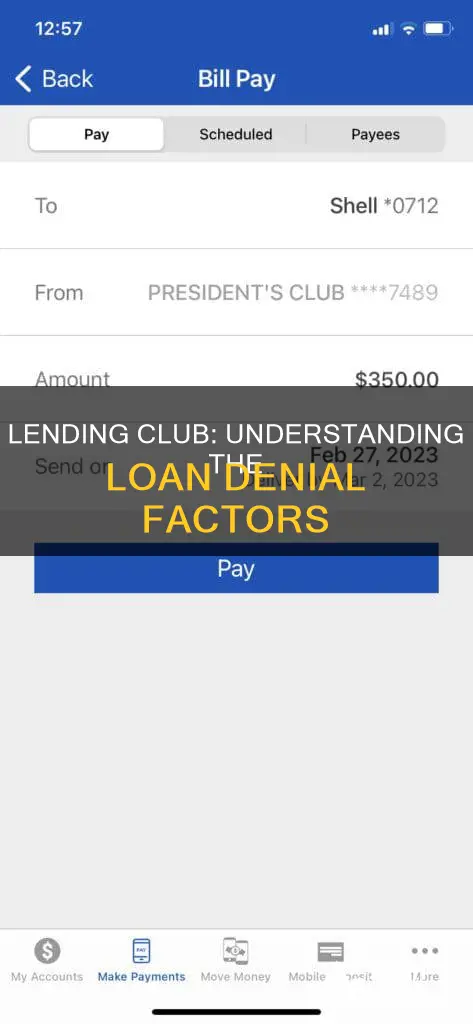
LendingClub is a legitimate online financial services company that provides peer-to-peer lending for personal and business loans. The company does not have a minimum income requirement, but it does not approve applicants unless it is clear that they can pay back the loan. Applicants must be at least 18 years old, have a Social Security number, and have a verifiable bank account. They must also live in a U.S. state or Washington, D.C. LendingClub also requires a minimum credit history of 37 months and a debt-to-income ratio of 40% for single applications and 35% for joint applicants. If you are denied a loan by LendingClub, you will receive an adverse action notice explaining the reasons for the denial.
| Characteristics | Values |
|---|---|
| Reason for denial | Poor credit score, high debt-to-income ratio, insufficient income, or other reasons related to credit history |
| Notification | Lender sends an adverse action notice listing the reasons for denial |
| Credit score impact | Soft credit inquiry performed initially, but a hard credit inquiry may lower the applicant's score for a few months |
| Recourse | Applicants can review their credit report, address any errors, improve their credit, reduce debt, or apply with a co-signer or co-borrower |
| Alternatives | Lending Club provides information on lending partners, and applicants can explore other lenders |
| Grace period | Lending Club offers a 15-day grace period for monthly payments without charging late fees |
What You'll Learn

High debt-to-income ratio
LendingClub does not specify a minimum credit score, but online sources state that a score of 600 may qualify for a loan. The company also requires a minimum credit history of 37 months and a debt-to-income ratio (DTI) of 40% for single applications and 35% for joint applicants.
LendingClub uses the DTI to determine whether a borrower qualifies for a loan. The DTI is a comparison of an individual's income to their current debt load. It is calculated by adding up all recurring monthly payments and dividing that number by the gross monthly income. The result is then multiplied by 100 to get the final DTI ratio.
A high DTI can be a reason for LendingClub to deny a loan application. This is because the DTI is used by lenders to evaluate an individual's ability to take on more debt and their borrowing risk. A high DTI indicates that an individual's loan payments are consuming a large portion of their monthly income, which may be a sign of financial strain.
Lenders typically want to see that an individual's income is consistent and that it will remain so in the future. Therefore, if an individual has different pay stubs, recently changed jobs, or has freelance work from multiple employers, it may create a snag in the income calculations and affect their loan application.
Understanding Land Loans: The NOI Factor
You may want to see also

Poor credit score
Lending Club is an online platform for personal and business loans. When you apply for a loan, your credit score is a big factor in determining your interest rate and whether you qualify for a loan. Your credit score is an estimate of how likely you are to repay your financial commitments. It is calculated using information from your credit report, including your credit and loan balances and your track record for repaying them.
If you are denied a loan by Lending Club, it could be because your credit score is below the minimum score of 620, or because the amount you want to borrow represents too much debt compared to your income. A poor credit score can be caused by a number of factors, including late or missed payments, high balances on credit cards, and public records such as tax liens or bankruptcies.
If you are denied a loan due to a poor credit score, there are several steps you can take to improve your chances of approval in the future. Firstly, check your credit report for any errors or inaccuracies and dispute them with the credit bureau if necessary. You can request a free copy of your credit report from annualcreditreport.com or review your credit score and report through Credit Karma. Additionally, consider taking steps to improve your credit score, such as setting up automatic bill payments or creating calendar reminders to ensure timely payments. You can also work on reducing your credit card balances and improving your debt-to-income ratio.
It is important to note that checking your rate with Lending Club will not impact your credit score. However, if you get approved and accept the terms, Lending Club will perform a hard credit pull which can lower your score for a few months. Therefore, it is recommended to wait at least six months between loan applications to let your score recover.
Koha's Interlibrary Loan System: How Does It Work?
You may want to see also

Insufficient income
LendingClub is an online platform for personal and business loans. When you apply for a loan, LendingClub performs a soft credit inquiry to understand your credit history, which doesn't affect your credit score. However, if you take a loan with LendingClub, it's recommended to wait at least six months before applying for another loan to let your score recover.
LendingClub may deny your loan application due to insufficient income. Lenders want to see that your income is consistent and stable so they can assume it will remain so in the future. If your income is below the lender's threshold, you may be denied or offered a lower loan amount. Lenders will also look for proof of income to verify that you can repay the loan. This may include documents such as recent pay stubs, bank statements, or tax returns.
If you have a fluctuating income due to self-employment or seasonal work, your application may still be considered. Some lenders may be willing to review your past tax returns to compare your income over a longer period. It's important to include all forms of income in your application, including income from side gigs, investment accounts, or child support payments.
If your loan application is denied due to insufficient income, you can consider the following steps:
- Review your income and expenses: Analyze your financial situation to identify areas where you can increase your income or reduce your expenses. This can help improve your debt-to-income ratio and make your application more favourable.
- Provide additional income information: Ensure that you include all sources of income in your application, as mentioned earlier. This can help lenders accurately assess your repayment ability.
- Apply with a co-signer or co-borrower: Consider applying for the loan with another person, such as a co-signer or co-borrower, who can help strengthen your application and improve your chances of approval.
- Request a smaller loan amount: Applying for a smaller loan amount may make your application more appealing to lenders as it appears less risky. While it may not align with your initial financial goals, it can increase your chances of approval.
- Explore alternative lenders: If LendingClub denies your application, consider researching and applying with other lenders who may have different income requirements or criteria.
Lenda's Loan Services: Availability and Options
You may want to see also

Low credit history
Lending Club is an online platform for personal and business loans. The platform asks users to specify the amount of money they want to borrow, the purpose of the loan, and their credit score. If a user is denied a loan, they receive an adverse action notice, which lists the reasons for the decline.
A low credit history is one of the reasons why Lending Club might deny a loan application. If you have had credit hiccups in the past, such as past due accounts, collections, or bankruptcy, your credit score may not meet the lender's minimum requirements. A credit score below 620 is considered a low credit score and can lead to a loan application being denied.
To improve your chances of approval, you can take steps to improve your credit score. This includes consolidating debt, which can help raise your score over the long term. Lowering your credit card balances and making on-time loan payments can also help improve your credit score. You can also order your credit reports free of charge through AnnualCreditReport.com to see where you can improve.
Additionally, even if your credit history is okay, a high debt-to-income ratio (DTI) can lead to a loan application being denied. A low DTI, generally under 40%, signals to lenders a healthy balance of debt to income. To calculate your DTI, add up all your current debt, including credit cards, auto loans, and student loans, and divide it by your income. If your DTI is too high, paying down debt can improve your debt-to-income ratio and increase your chances of approval.
Leasing a Vehicle: A Loan or Not?
You may want to see also

Inconsistent income
LendingClub is an online platform for personal and business loans. It performs a soft credit inquiry to understand your credit history, which doesn't affect your credit score. However, if LendingClub denies you a loan, there are several reasons this could be the case.
LendingClub may have denied your loan application due to inconsistent income. Lenders look for income stability and proof of income to verify that you can repay what you borrow. If your income is below the lender's threshold, your application may be denied, or you may be offered a loan for a lower amount. Lenders generally want to see that any income listed on your application has been consistent so they can assume it will remain so in the future. If you have different pay stubs, recently changed jobs, or have freelance work from multiple employers, it may create a snag in your income calculations.
If your income fluctuates because you're self-employed or do seasonal work, this doesn't mean your application will always be declined. While your paychecks may not be consistent or predictable, some lenders may be willing to look at your past tax returns so they can compare your income over a longer period. Make sure to include all forms of income in your application, including any income from side gigs, investment accounts, or child support payments.
If you don't have a steady income, applying with another person could help get your application approved. Applying with a co-signer or co-borrower might even help you secure a better loan than you would have received on your own, such as a better rate or a higher loan amount. However, both individuals are obligated to repay the loan, and both have rights concerning the funds.
LendingClub loans fall into three categories of verification: Income verified, Income source verified, and Not verified. If your income cannot be verified, your loan request will likely be declined.
Lazada's Loan Services: What You Need to Know
You may want to see also
Frequently asked questions
Lending Club may deny your loan application due to a poor credit score, high debt-to-income ratio, or insufficient income. If your credit score is below 600, Lending Club may not approve your loan application.
If your loan application is denied, you can review your credit report and check for any negative marks that could have affected your application. You can also request your credit report information for free through annualcreditreport.com or review your credit score and report through Credit Karma.
If Lending Club denies your loan application, you can consider other lenders or apply through Lending Club's lending partners. You can also wait for your credit score to improve and reapply after some time.







